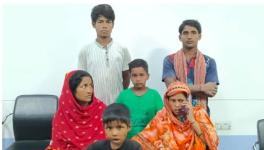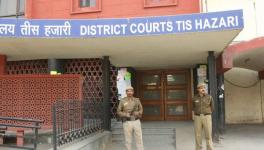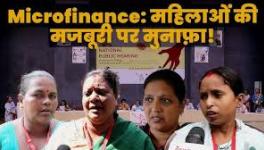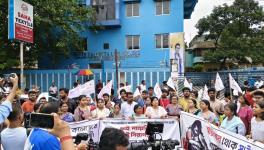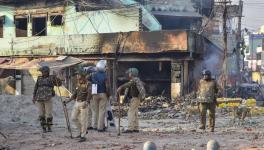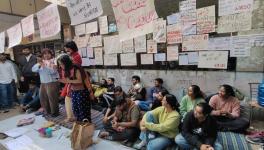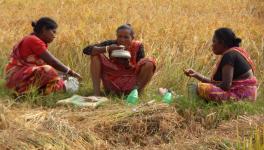A Demand for ‘Half the Earth and Half the Sky’ at Jantar Mantar
Shortly after a 23-year-old was brutally gang-raped on a moving bus in Delhi, a group of mostly young people took to the streets, sparking off debates in the media and political circles over violence against women.
This unprecedented public gathering for gender justice began in the third week of December last year when loosely organized groups of students, working women, and people from all walks of life marched down to India Gate to protest and call for speedy justice to the victim.
The public and media attention that the protests had managed to pull in has injected new life to numerous struggles, which never had a face that could catch someone’s eye, or a voice that could get somebody to lend a sympathetic ear. As more and more protest groups came together across several parts of the Delhi-NCR, the state of Haryana made it to the papers once again for all the wrong reasons.
Voices from Haryana:
Over the last few years, there have been several incidents of violence against women; rape, for instance, has become practically an epidemic. According to newspaper reports, a dozen cases of rape were recorded in the month of September alone last year. Many regions of the state are in the grip of the sweeping, reactionary diktat of the Khap Panchayats. This has meant an onslaught on women in general, and dalit and tribal women in particular.
Against this backdrop, a number of women’s groups came together to initiate a three-day protest programme- Women Against Violence - from 13th to 15th January at Jantar Mantar. The idea behind the programme was to stage a Jan Sunwai, a public hearing, to give the families of gang-rape victims from Haryana their chance to narrate their stories of delayed justice. The families' testimonials were presented to Home Minister Sushil Kumar Shinde.
The stories heard at the Jan Sunwai revealed the apathy and inefficiency of the police and administration. Speaker after speaker underlined that the authorities only respond to the rich and well connected. This, further, make it harder for the victims and their families to survive. The families narrated their grievances and circumstances during the three-day public hearing.
Gang-rapes of Minor & Physically or Mentally Challenged Girls
A rickshaw-puller from Gurgaon was in the national capital to tell the story of his six-year-old daughter who was gang-raped on the 11th of October last year. The girl who was playing outside her house, was lured with a toffee by a neighbour. The neighbour then invited two other men and all three raped the girl. The mother of the girl later found her covered in blood. She was taken to the police station where the police kept her for about an hour without taking her to hospital. The Janwadi Mahila Samiti intervened and later took her to hospital where the girl had to wait again for medical help.
Another woman from a village in Haryana participated in the three-day Jan Sunwai to narrate the rape incident of her brother’s visually challenged daughter. The parents had gone to work when the owner of the house they had rented, along with four other men in a drunken state, raped the girl and threw her out. The girl’s mother fainted when she found her in that state. The police arrested two while three are still on the run. The police also locked the house after the incident for further investigation.
Incest
It is not just the police who create problems for the victims and their families, but the extended family as well. One such case was narrated by a man from Rohtak, who told his sister’s story. Two men kidnapped his sister in their car, took her to a closed factory outside of the city and raped her. The girl escaped and told her mother what had happened. The two men were arrested. But since one of them is a family member, the rest of the family has been pressurizing and bribing the victim and her family to withdraw the case. The state has not helped the victim either in terms of rehabilitation or money that could help the family with the expensive procedure of court cases.
The law makes it mandatory for the state to provide monetary assistance of one lakh rupees to a woman who is raped. The amount extends to three lakh rupees in case the girl is underage. The state is to provide for counseling of the rape victim to help her cope with the trauma and provide her with vocational training for future employment opportunities. However, the state, more often than not, has failed to deliver on its part.
Cracking Down on Demand for Rights
Another story comes in from the Manesar region of Haryana, where the usual 'trend' followed by the police and people in power is that whenever women demand their rights, or labour groups, better working conditions, they are laid off from work, or put behind bars.
The stories of the victim and their families are faces behind the data, which are easily forgotten. The conviction rates in Haryana, as in other parts of India, are very low. When voices are raised, they are either muffled by some minister announcing compensation for the victim or completely silenced by threatening and attacking the victim and her family.
Demanding ‘Half the Earth and Half the Sky’
The women gathered at Jantar Mantar demanded an effective infrastructure with fair and sympathetic police personnel. The three-day protest was to give the families of gang-rape victims from Haryana a forum to tell their stories and demand justice. But the stories also tell us something more: the ways in which the patriarchal society we live in works. Misogyny has seeped into all spheres of our lives, starting with families where women are treated as unequal members. The rape culture prevalent in the society tolerates and justifies rape by 'normalizing' it. And the state, which should ensure equality of both sexes, turns a blind eye to violence against women. In fact, it often misuses its powers to maintain the status quo led by the self-appointed patriarchs and the politically influential.
Disclaimer: The views expressed here are the author's personal views, and do not necessarily represent the views of Newsclick
Get the latest reports & analysis with people's perspective on Protests, movements & deep analytical videos, discussions of the current affairs in your Telegram app. Subscribe to NewsClick's Telegram channel & get Real-Time updates on stories, as they get published on our website.










